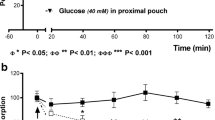Summary
An increased pressure in the intestinal vessels causes an increased discharge from the Pacinian corpuscles and reduces systemic arterial blood pressure. A decrease of pressure in the intestinal vessels reduces the discharge rates from the Pacinian corpuscles and causes a rise of blood pressure. Stretching the intestinal wall stimulates the receptors enclosed in it and increases arterial blood pressure. The relationship between intestinal stimulation and blood pressure depends on the interaction between the discharges from the Pacinian corpuscles and from the receptors of the intestinal wall.
Similar content being viewed by others
Literature Cited
V. A. Alekseev, Transactions of the Military and Maritime Medical Academy [in Russian] (Leningrad, 1952) Vol. 39, p. 290.
N. A. Anikina, Byull. Éksp. Biol. i Med,42, 7, 8 (1956). Original Russian pagination. See C.B. translation.
N. A. Anikina, Byull. Éksp. Biol. i Med,42, 8, 6 (1956). Original Russian pagination. See C.B. translation.
N. A. Anikina, The Electrophysiological Characteristic of the Afferent Pulses in the Nerves of the Intestine Produced by Various Chemical Stimuli, Candidate's Dissertation [in Russian] (Moscow, 1956).
V. E. Delov, P. A. Kiselev et al. in the book: Problems of the Physiology and Morphology of the Central Nervous System [in Russian] (Moscow, 1953) p. 31.
O. N. Zamyatina, Author's Dissertation: Electrophysiological Investigations of the Afferent and Efferent Pulses in the Nerves of the Intestine [in Russian] (Leningrad, 1954).
N. A. Lapshin, in: Problems of Experimental Biology and Medicine (Moscow, 1952) No. 2, p. 9.
V. A. Lebedeva, in: Problems of the Physiology of Interoception [in Russian] (Moscow-Leningrad. 1952) No. 1, p. 273.
A. A. Oganesyan, in: Scientific Transactions of the Institute of Physiology of the Armenian SSR [in Russian] (Erevan, 1949) Vol. 2, p. 113.
V. N. Chernigovskii, Fiziol. Zhur. SSSR29, 1–2, 3 (1940).
V. N. Chernigovskii, The Afferent Systems of the Internal Organs [in Russian] (Kirov, 1943).
G. L. Brown and J. A. B. Gray, J. Physiol.107, 306 (1948).
G. D. Gammon and D. W. Bronk, Am. J. Physiol.114, 77 (1935).
B. Gernandt and Y. Zotterman, Acta Physiol. Scandinav.12, 56 (1946).
Author information
Authors and Affiliations
Rights and permissions
About this article
Cite this article
Anikina, N.A. Two types of afferent influence of the mechanoreceptors of the small intestine on the blood pressure. Bull Exp Biol Med 50, 895–899 (1961). https://doi.org/10.1007/BF00797473
Received:
Issue Date:
DOI: https://doi.org/10.1007/BF00797473




